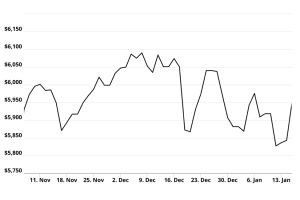
While bank stocks are constantly in the headlines, financial services stocks often fly under the radar. Yet, the best financial services stocks enjoy better economics as service providers to the financial system. Notably, the financial services industry offers several franchises with best-in-class profitability.
One major reason elevates financial services stocks as the best risk-reward plays in the financial sector. While banks take all the credit risk and are prone to blowups when financial conditions decline, financial services are insulated from the extreme volatility. Typically, they act as a toll booth, earning a fee on processed transactions without taking on operating and balance sheet risks.
Let’s highlight some of the best financial services stocks you can buy. These companies consistently generate a high return on invested capital. Furthermore, they return a substantial portion of the excess cash they generate through buybacks. Considering their long-term growth, these financial services stocks are bargain buys at these levels.
Fiserv (FI)

Fiserv (NYSE:FI) operates in three main divisions: merchant acceptance, core banking software and issuer processing services. This payment processor has demonstrated strong competitive advantages and a virtuous cycle of investment. Unsurprisingly, last year was the 38th consecutive year of double-digit earnings growth.
With growth accelerating, its crown jewel, Clover, is among the best financial services stocks. Today, Clover is larger than its competitor, Square, owned by Block (NASDAQ:SQ), and is growing faster. In calendar year 2023, Clover achieved $261 billion in volumes compared to Square’s $210 billion. In terms of growth, in Q1 2024, revenues and volumes grew by 30% and 19% year-over-year, respectively.
Clover’s growth is accelerating, leading to operating leverage on its fixed cost base. As a result, Fiserv has shown robust free cash generation and has been aggressively buying back shares. In 2023, it repurchased over $1 billion of shares in each of the four quarters. Q1 2024 saw a continuation of this pattern as the company repurchased 10.2 million shares of common stock for $1.5 billion.
Even better, management guided organic revenue growth between 15% to 17% for 2024. In terms of earnings, they see 14% to 16% growth, leading to EPS in the range of $8.60 to $8.75. This translates to 17 times forward earnings, a bargain for a compounder like Fiserv.
MSCI (MSCI)

This financial services company offers data, software and market indices to asset owners and managers. The indices and analytics MSCI (NYSE:MSCI) provides are vital in running portfolio analyses, measuring performance and displaying results. Furthermore, most institutional investors invest based on these benchmarks and are unwilling to invest in a fund with a different benchmark.
Today, the shift from active to passive funds makes benchmarks more important. MSCI’s market index business is a huge contributor, accounting for 60% of revenues and 80% of operating profit. The firm enjoys leadership in this market, especially in the international markets where it was an early entrant.
Over the years, management has done a stellar job of growing revenues and profits. Revenues have grown from $996 million in 2014 to $2.5 billion in 2023. Over the same period, EBITDA margins have improved from 41% to 60%. Still, there is potential for margin improvement since a huge portion of incremental revenues drop directly to the bottom line.
After falling 12% year-to-date, MSCI stock is one of the best financial services stocks to buy. It’s trading at 33 times forward non-GAAP earnings compared to a five-year average of 44. At these levels, management could accelerate buybacks, boosting the stock, according to Redburn Atlantic’s Russell Quelch.
CME Group (CME)

Exchanges are the perfect way to participate in economic activity. Businesses need to hedge risk and transact on a wholesale and secure basis and exchanges like CME Group (NASDAQ:CME) offer a centralized and regulated way to do so.
The main bullish case for CME group is its asymmetric positive economic exposure. It provides computer trade matching and information platforms to trade and hedge various assets, earning a fee from these transactions. Therefore, they participate in growth in line with economic expansion. Even better, they offer these services without taking on the leverage, operating risk and heavy capital expenditure that their customers take on.
CME Group has benefited as trading volumes have expanded. Over the past five years, it has compounded revenues at 5% annually. What’s more, it has maintained best-in-class profitability. Since 2019, free cash flow margins have averaged 58%. Even better, in 2023, free cash flow margins were 61.3% and EBITDA margins hit 68%.
Management has taken advantage of this robust free cash flow generation to reward shareholders. Besides buybacks, it occasionally declares special dividends, such as the $1.9 billion annual variable dividend issued in December 2023. With better data access and analysis, lower fees, faster execution and lower barriers boosting transaction volumes, CME Group will remain among the best financial services stocks.
On the date of publication, Charles Munyi did not hold (either directly or indirectly) any positions in the securities mentioned in this article. The opinions expressed in this article are those of the writer, subject to the InvestorPlace.com Publishing Guidelines.
On the date of publication, the responsible editor did not have (either directly or
indirectly) any positions in the securities mentioned in this article.



